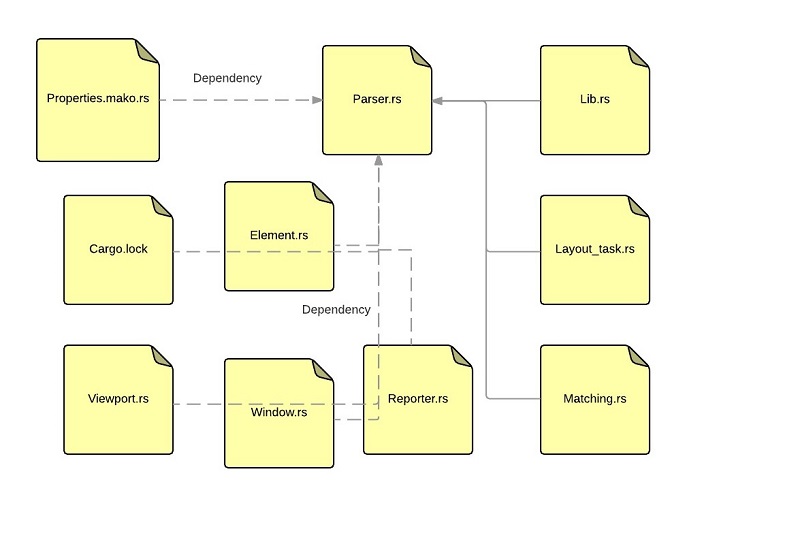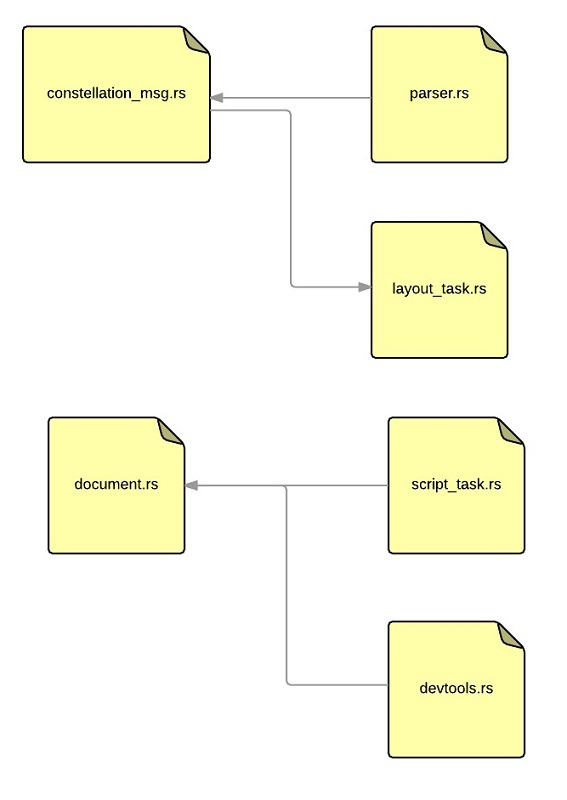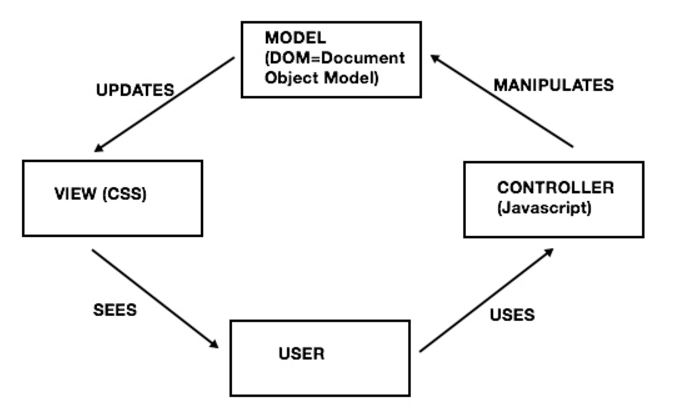CSC/ECE 517 Fall 2015 M1501 Report CSS errors to the devtools, both stored and live: Difference between revisions
(→Step 3) |
(→Step 3) |
||
| Line 223: | Line 223: | ||
Process the new message type in components/script/script_task.rs by: | Process the new message type in components/script/script_task.rs by: | ||
caching each reported parse error in a vector in Document (components/script/dom/document.rs) | |||
* | * | ||
checking the devtools_wants_updates flag and sending it to the devtools server if it exists (see notify_devtools for a model in script_task.rs) | |||
* | * | ||
Revision as of 02:41, 12 December 2015
Introduction
Rust
Rust is a programming language developed by Mozilla. It is used to design concurrent and safe systems. It is a systems programming language focused on three goals: safety, speed, and concurrency. It maintains these goals without having a garbage collector, making it a useful language for a number of use cases other languages aren’t good at: embedding in other languages, programs with specific space and time requirements, and writing low-level code, like device drivers and operating systems. <ref>http://doc.rust-lang.org/nightly/book</ref>
Servo
Servo is an experimental web browser layout engine. It is developed by Mozilla and written in Rust. It provides an API for hosting the engine within other software. The Servo browser currently provides developer tools to inspect DOM, execute JavaScript remotely.
Project Description<ref>https://github.com/servo/servo/wiki/CSS-parse-error-reporting</ref>
In this project we are adding capability to expose CSS parse errors, which are essentially syntax errors through developer tools in Servo. We are using Firefox remote developer tools, which is the capability to communicate with an arbitrary distant server that implements a protocol for exposing information about its web content.
As part of the scope of this project we are using Firefox remote developer tools to inspect and debug the code in Servo. Servo, is an experimental web browser from Mozilla which is under development. This project contributes to the development of this web browser Servo.
Servo implements a very basic developer tools server. This server currently supports executing JavaScript remotely and investigating the DOM (Document Object Model) tree in the document inspector. The scope of the project is to expand those capabilities by exposing CSS parsing errors.
Program Flow
Initial steps
- Choose a website compatible with Servo and attach the remote developer tools to it.
- Introduce traits, methods and structure members as per the project requirement
- Generate CSS error messages
- Build servo again with the changes
Subsequent steps
- Generate messages which communicate the errors to the script thread.
- Process the messages and provide support for caching them and sending them to the devtools server if it exists.
- Provide the functionality to retrieve the cached CSS error messages whenever requested.
Environment Setup<ref>https://github.com/servo/servo</ref>
Pre-requisites
On Debian-based Linuxes:
sudo apt-get install curl freeglut3-dev\
libfreetype6-dev libgl1-mesa-dri libglib2.0-dev xorg-dev \
gperf g++ cmake python-virtualenv python-pip \
libssl-dev libbz2-dev libosmesa6-dev libxmu6 libxmu-dev libglu1-mesa-dev
On Fedora:
sudo dnf install curl freeglut-devel libtool gcc-c++ libXi-devel \
freetype-devel mesa-libGL-devel glib2-devel libX11-devel libXrandr-devel gperf \
fontconfig-devel cabextract ttmkfdir python python-virtualenv python-pip expat-devel \
rpm-build openssl-devel cmake bzip2-devel libXcursor-devel libXmu-devel mesa-libOSMesa
Cloning servo
git clone https://github.com/servo/servo
Building Servo
cd servo ./mach build --dev ./mach run tests/html/about-mozilla.html
Requirement Analysis (includes Changes Proposed)
Steps completed in the OSS project -
Setting up ParserContext structure
- define a new trait called ParseErrorReporter in components/style_traits/lib.rs with an appropriate method to report an error
- add error_reporter member to ParserContext that uses this method
- make log_css_error in components/style/parser.rs take an &ParserContext argument and call this method
- extract the existing code from log_css_err into a new type that implements ParseErrorReporter in components/layout/layout_task.rs and pass instances of that type to any code that ends up creating a ParserContext value
- find all the affected dependencies in rest of the files calling methods and structures implemented from above steps
- at this point, Servo should compile and execute almost exactly as before, but where RUST_LOG=style used to expose CSS errors, now RUST_LOG=layout::layout_task will be required instead.
UML Component diagram
Steps to be followed for final project -
Setting up notifications to devtools
- Add a PipelineId (from components/msg/constellation_msg.rs) member to ParserContext, to represent the source of parse errors that occur
- Define a new message type in ConstellationControlMsg which contains all of the information necessary to report a CSS error (including the pipeline ID), and make this new error reporter communicate with the script thread by sending messages over a Sender<ConstellationControlMsg> value that can be obtained from the code in layout_task.rs.
- Process the new message type in components/script/script_task.rs by -
* caching each reported parse error in a vector in Document (components/script/dom/document.rs) * checking the devtools_wants_updates flag and sending it to the devtools server if it exists (notify_devtools for a model in script_task.rs)
- Retrieve any cached parse errors for a document on request in handle_get_cached_messages in components/scripts/devtools.rs
UML Component diagram
The following diagram is not exhaustive. The dependencies will be be revealed during the implementation.
Appurtenant tasks -
- Since we are working on the main servo build, the changes we make to the build usually has a cascading affect on dependent libraries and files. We are also doing the tasks of resolving the issues caused by the dependencies. So, the scope of the requirements are larger than those specified above.
Design information
MVC pattern is employed in the tool for CSS parse error reporting as shown below:
Testing the code
The correctness of the changes made are tested through 3 methodologies -
Build test
The following command on linux command line compiles and verifies if the code changes are syntactically correct.
./mach build --dev
Tidy code test
The following command on linux command line tests if the code though syntactically correct complies with the Mozilla's best practices of coding
./mach test-tidy
Logical test
After passing the above tests a pull request is made to the master branch of main servo build. The code changes will then be reviewed by our points of contact from Mozilla team. Mozilla team then verifies the correctness of the code and recommend changes if some improvements are needed.
Completed tasks
Step 1
Add a PipelineId (from components/msg/constellation_msg.rs) member to ParserContext, to represent the source of parse errors that occur
- We initially included a new member in parser.rs as suggested above (along with changes in lib.rs and Cargo.toml in same folders as parser.rs in order include the struct into the file), but it was seen that the class-name PipelineId could not be used directly to instantiate a variable.
- Hence, we were suggested by Josh to define a function to return the PipelineId member in ParseErrorReporter trait and remove the PipelineId member from ParserContext. We were asked to use the existing ParseErrorReporter member error_reporter to return the PipelineId value from trait ParseErrorReporter. Following were the exact suggestions from Josh -
- Get rid of the new member in ParserContext - Add a new method to the ParseErrorReporter trait which returns a PipelineId value - Add a new PipelineId member to the CSSErrorReporter struct, and make the new method return that value in the ParseErrorReporter implementation for CSSErrorReporter - call the new method using the ParseErrorReporter member that already exists in ParserContext instead of using the PipelineId member originally described in the task
- Now, to include this function in ParseErrorReporter which was defined in components/style_traits/lib.rs we had to declare a crate for msg folder inside this lib.rs and also include a use statement for msg::constellation_msg::PipelineId. We also had to include the path of the corresponding the msg folder in components/style_traits/Cargo.toml. But this caused the issue of cyclic dependency, since constellation_msg.rs already had included the folder components/style_traits into its lib.rs.
- Cyclic dependency : components/style_traits/lib.rs dependent on itself
- When we communicated this problem to Josh, he suggested us to move the definition of the trait ParseErrorReporter from components/style_traits/lib.rs to components/msg/lib.rs itself
- This solved the previous error but threw an error is all places where ParseErrorReporter trait was used. This was because previously all functions were using "use style_traits::ParserErrorReporter" (and corresponding changes in lib.rs and Cargo.toml) to obtain the definition of ParseErrorReporter. We just had moved this declaration to another file in our previous step. We had to go to about 7 different files and change the include statements to "use msg::ParserErrorReporter" (and also make the corresponding changes to their lib.rs and Cargo.toml).
- After solving the previous error, another set of errors on pipelineid showed up. We realized that there was another trait called StdoutErrorReporter which was analogous in definition to our ParseErrorReporter. Hence, we had to make all the changes we made in ParseErrorReporter also in StdoutErrorReporter.
- After solving the previous error, we met another set of errors. Apparently, the Rust language as upgraded recently as a result of which syntaxes of some functions calling member functions of StdoutErrorReporter had to be changed from:
let error_reporter = box StdoutErrorReporter; to
letbox error_reporter = StdoutErrorReporter {
pipelineid: self.pipelineid,
};
- Also, after solving the previous error we had another set of errors where we found the same dependency as previous step in a function call present in a file which was not part of project description. The lines higlighted below were throwing an error in selector_matching.rs and also in 2 other similar files:
lazy_static! {
pub static ref USER_OR_USER_AGENT_STYLESHEETS: Vec<Stylesheet> = {
let mut stylesheets = vec!();
// FIXME: presentational-hints.css should be at author origin with zero specificity.
// (Does it make a difference?)
for &filename in &["user-agent.css", "servo.css", "presentational-hints.css"] {
match read_resource_file(&[filename]) {
Ok(res) => {
let ua_stylesheet = Stylesheet::from_bytes(
&res,
Url::parse(&format!("chrome:///{:?}", filename)).unwrap(),
None,
None,
Origin::UserAgent,
box StdoutErrorReporter);
stylesheets.push(ua_stylesheet);
}
Err(..) => {
error!("Failed to load UA stylesheet {}!", filename);
process::exit(1);
}
}
}
for &(ref contents, ref url) in &opts::get().user_stylesheets {
stylesheets.push(Stylesheet::from_bytes(
&contents, url.clone(), None, None, Origin::User, box StdoutErrorReporter));
}
stylesheets
};
}
So, we had to change the statements -
box StdoutErrorReporter to
box StdoutErrorReporter { pipelineid: PipelineId::fake_root_pipeline_id() }
- We also had to make a similar change to files like report.rs and window.rs containing the following statement:
let error_reporter = CSSErrorReporter; to
let error_reporter = CSSErrorReporter { pipelineid: PipelineId::fake_root_pipeline_id() }; or
let error_reporter = box CSSErrorReporter { pipelineid: self.pipelineid, } ; based on the context
- Along with the changes mentioned above we had to take care of some more minor errors and dependencies. Our final changes for step 1 is available in the following link of our commit to our forked repository:
https://github.com/GauriGNaik/servo/commit/e5021c76d8239dacaff0771b043f648a97f71c42
Step 2
Define a new message type in ConstellationControlMsg which contains all of the information necessary to report a CSS error (including the pipeline ID), and make this new error reporter communicate with the script thread by sending messages over a Sender<ConstellationControlMsg> value that can be obtained from the code in layout_task.rs
Step 3
Process the new message type in components/script/script_task.rs by: caching each reported parse error in a vector in Document (components/script/dom/document.rs)
checking the devtools_wants_updates flag and sending it to the devtools server if it exists (see notify_devtools for a model in script_task.rs)
Step 4
Retrieve any cached parse errors for a document on request in handle_get_cached_messages in components/scripts/devtools.rs
See also
References
<references/>


